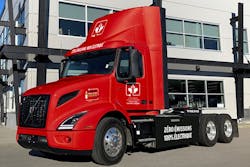Coca-Cola Canada Bottling and Distribution adds six Volvo Electric trucks
Coca-Cola Canada Bottling (Coke Canada Bottling) is purchasing six Volvo VNR Electric trucks as part of a pilot program to service its ‘Red Fleet’ customer delivery routes in the Greater Montreal area.
Coke Canada Bottling is an independently owned company that produces and distributes Coca-Cola products in Canada.
The trucks will represent the first Class 8 battery-electric trucks in Coke Canada Bottling’s fleet of 650 heavy-duty vehicles to serve customers throughout the region. The vehicles will be delivered throughout 2023 by Volvo Trucks North America.
Coke Canada Bottling utilized federal and provincial incentives for heavy-duty zero-emission vehicles funding to offset the cost of the six Volvo VNR Electric trucks.
The battery-electric fleet is equipped with a six-battery configuration that allows the trucks to cover up to 440 km (275 miles) on a single charge. This is sufficient for the trucks to make several daily round trips of 150 km (93 miles) between the company’s distribution center in Montreal and its customer locations.
The acquisition is part of the Coke Canada Bottling’s Toward a Better Future Together environmental sustainability action plan, which aims to reduce carbon emissions from direct sources and supplied energy by 46.2 percent by 2030.
“The electrification of our fleet is a key component of our plan to reduce direct carbon emissions,” said Todd Parsons, Chief Executive Officer at Coca-Cola Canada Bottling. “We know we continue to have work to do and look forward to working together with Volvo Trucks on opportunities to expand this pilot in years to come where it makes sense. We recognize we have a responsibility to effectively manage our environmental impact and we are working to decrease the emissions from our fleet.”
Fleet Electrification will be a key topic at T&D World Live happening Sept. 12-14 in Sacramento
Read more of our coverage on the Challenges and Promises of Fleet E-Mobility in EnergyTech
Coke Canada Bottling is said to be the first Canadian food and beverage manufacturer to use zero-tailpipe emission trucks. The company is actively pursuing fuel efficiency improvement through electrification and the usage of alternative fuel sources. It already uses light-duty electric service vehicles in the Greater Montreal area and B20 biofuels on all trucks manufactured after 2012, resulting in a reduction of over 1500 tonnes of CO2 emissions to date.
Coke Canada Bottling is also installing three 150 kW DC chargers with nine dispensers at its Montreal distribution center to support the charging needs of its battery-electric fleet. The installation of the charging infrastructure is expected to be completed in June 2023.
Volvo Trucks hosted a Demo Day on April 13 at Coke Canada Bottling's Montreal distribution center, allowing delivery drivers to test drive the new battery-electric trucks and learn ways to optimize the Volvo VNR Electric’s range, such as leveraging regenerative braking benefits to add power back to the battery.
“Coke Canada Bottling is making tremendous strides towards their environmental sustainability goals by adding Volvo VNR Electric trucks to their fleet to service their beverage customers in the greater Montreal region,” said Peter Voorhoeve, President, Volvo Trucks North America. “It was an excellent opportunity to mark this clean fleet milestone during Earth Month with Coke Canada’s employees and is a tremendous honor to partner with them as they continue their electromobility transition.”
About the Author
EnergyTech Staff
Rod Walton is head of content for EnergyTech.com. He has spent 17 years covering the energy industry as a newspaper and trade journalist.
Walton formerly was energy writer and business editor at the Tulsa World. Later, he spent six years covering the electricity power sector for Pennwell and Clarion Events. He joined Endeavor and EnergyTech in November 2021.
He can be reached at [email protected].
EnergyTech is focused on the mission critical and large-scale energy users and their sustainability and resiliency goals. These include the commercial and industrial sectors, as well as the military, universities, data centers and microgrids.
Many large-scale energy users such as Fortune 500 companies, and mission-critical users such as military bases, universities, healthcare facilities, public safety and data centers, shifting their energy priorities to reach net-zero carbon goals within the coming decades. These include plans for renewable energy power purchase agreements, but also on-site resiliency projects such as microgrids, combined heat and power, rooftop solar, energy storage, digitalization and building efficiency upgrades.
